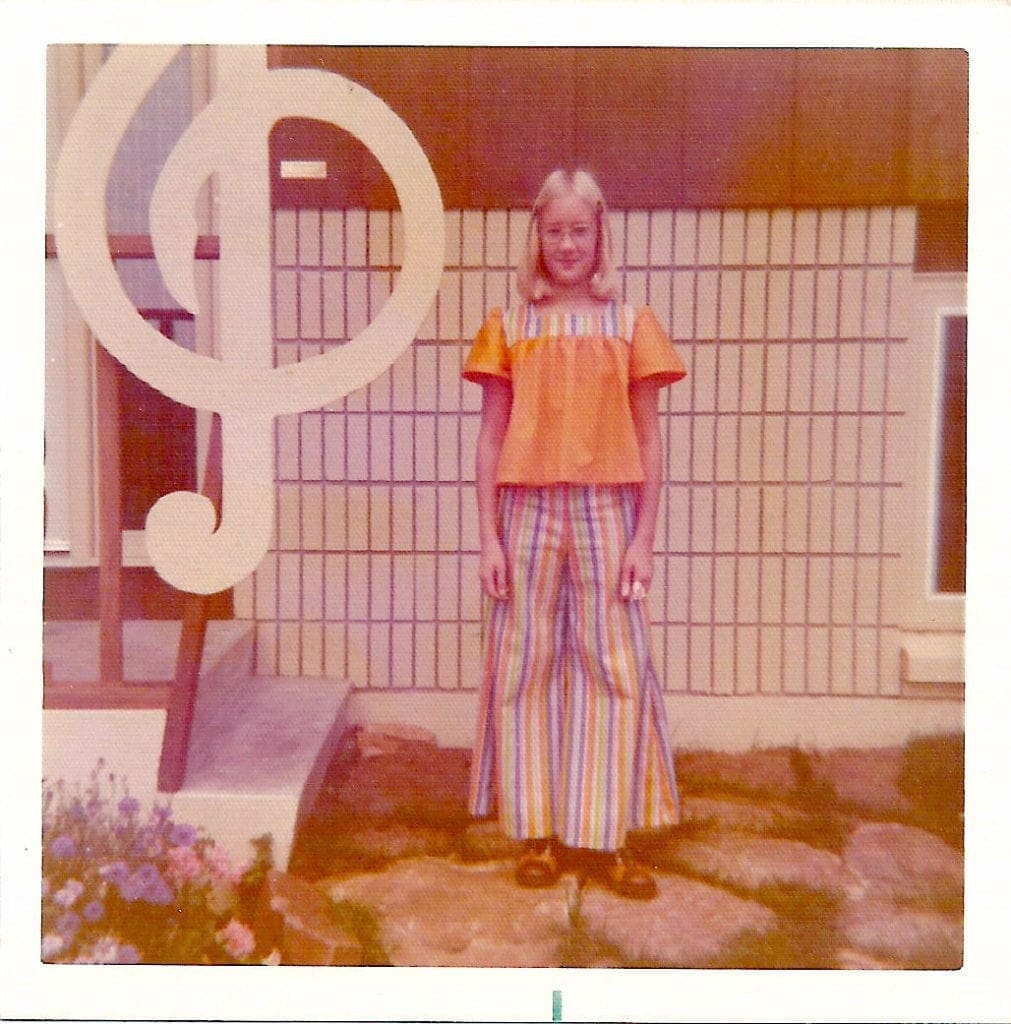Rice Lake, with a current population of 8500, was (and still is) the largest city for 100 miles in any direction, save for Eau Claire 60 miles away, which is where I went to college. Cedar Mall opened in 1976 on the south end of town, when I was in eighth grade, decimating the downtown when the department store Herberger’s moved to the mall. Along with Woolworth and JCPenney for anchor stores, the mall was the place to be. Very uptown. I’ve visited Cedar Mall in recent years, however, and it’s now a near-abandoned little ghost town.
Today, the city has continued to grow on both its southern and western edges—the lake itself is to the east—and the downtown is reviving, with petunias overflowing from a multitude of planters up and down Main Street. At the time we moved to Rice Lake, though, the mall hadn’t yet been built, and there were closer to 5000 people. Still, we were the biggest city for many miles. Consider how that could warp a person’s impression of the world.
I’m not clear about how long this move had been in the works when one day I was taken out to the garage in Barron to see something my dad had been working on. There before my eight-year-old eyes were hand-built kitchen cabinets that were quite remarkable. I was shown how the island included a pass-through silverware drawer you could pull out from one side for filling with clean items from the dishwasher, and then push through to the other side for easy access when setting the table. It worked similarly for the dishes.
In addition to the island, there was a large L-shaped section. What was most surprising was realizing how long this had to have taken to build. I have no recollection of my father not being there—I am guessing that between classes for his degree, teaching high school and going to barbershop rehearsals, he wasn’t there a lot—but I’d had no idea he had been out in the garage creating all this. Add this to the ongoing experience of not being spoken to, and it created a sinking feeling that I was perpetually out of the loop.
At the end of that school year, my whole world flipped on its head when I learned we would be moving. Like, next week. My parents had probably waited for the school year to be done before putting our house up for sale, and then it had sold in a day. Plans were apparently already underway to build a new house on an empty lot in Rice Lake—where obviously those kitchen cabinets would go—but all of this was news to me. What bothered me most was learning that my brothers had already been told. My feelings were deeply hurt.
The lot my parents bought was located two short blocks from Rice Lake High School, which was across the street from Jefferson Elementary School and just one block down the hill from Rice Lake Middle School. So, of course, we walked to school every day. Oddly, when we were younger, every now and then when I stopped by my friend Janet’s house to pick her up on the way, her dad would drive us. It wasn’t until much later in life that Janet clued me in: On those days, the temperatures were well below zero.
Without a house in Barron, but without a house built yet in Rice Lake, we were in a pinch. So my parents got creative and for the next five months, all five of us lived in a 26-foot Rolite camper. They parked it first in the driveway and later under the huge oak tree in the backyard, likely to have a little shade. (Air conditioning would not be an amenity we’d enjoy in the house, either.) When we purchased the lot, the tree was already equipped with a three-story tree house that regularly drew a flock of kids. We scampered around on the branches playing tag in that tree until a neighbor told my parents how liability works if someone goes splat.
It would be another year before my dad finished the house—I suspect drinking slowed the process down a lot—so we spent that next year living in the basement of the new house. With my dad being a young college professor, my parents would go on to host cast parties for the shows produced at the campus, like Man of LaMancha, in our basement. Given the amount of drinking involved, it was, in my mother’s words, “an accident waiting to happen.”
My dad was an exceptional handyman and I am sure money was tight, but the decision for him to do all the finishing work on the new house—including some of the major systems like electrical—was ill-advised. It overly strained an already failing system. We kids got recruited to help with some of it, like staining and varnishing the woodwork. I think there were something like 14 coats of varnish applied. I’m serious.
Being the von Trapp family that we were, no house of ours could be complete without an eight-foot-tall treble clef sign on the front steps. Of course, when you’re a kid, you don’t know that what happens in your family may or may not be what goes on in any other home. I wasn’t bothered by the treble clef sign but also didn’t notice that no one else had one. Until one day in fourth grade or so, I was called into the teacher’s lounge where a teacher asked me, “Do you live in the house with the treble clef sign on the front?”
“Yes?” I stammered.
“Why do you have that?”
“Because my dad’s a music teacher?” They all laughed, in genuinely good humor, and let me go. I was still not bothered that we had a treble clef on the front of the house, but now I was aware we were the only ones who did.

[Addendum of Sorts, from my mom about “There before my eight-year-old eyes were hand-built kitchen cabinets that were quite remarkable…Plans were apparently already underway to build a new house on an empty lot in Rice Lake—where obviously those kitchen cabinets would go—but all of this was news to me.”:Ed started teaching in Barron in 1961. After living in an apartment for one year, we rented a house in Barron, which we soon then purchased on a land contract. It was in really tough shape. We were young (23 and 22) and ready for an adventure. Ed and I both worked very hard restoring that house, actually tearing it down to the studs and putting it back together again.
In the fall of 1968 Ed was hired to teach music at UWBC, which meant commuting from Barron to Rice Lake. I had gone to work in the Department of Social Services in Barron in 1964. The commute was getting old for Ed and the idea of moving was in the air, but Ed and I hadn’t talked about it.
A group of us from the courthouse would go out for coffee each morning and while at the restaurant one morning I was commenting to the gals at our table, “I wonder if we should be thinking about moving to Rice Lake?” (This was April, 1971.) A fellow at a nearby table overheard me talking. He approached me and asked, “Are you selling your house? We’re moving to Barron and would be interested.” I said, “Well, I don’t know. We haven’t talked about it.”
He and his wife came to look at the house some days later and offered to buy it on the spot. At this point we’d just pretty much finished the restoration on the house and I remember not being so sure it was a good idea to sell it, but we did. The decision was made and then it was hurry up and make a plan. They wanted to be in the house as soon as possible.
We found a lot in Rice Lake that looked like it would be good for us as a family—close to schools. Talked with a carpenter friend in Barron who was willing to rough up the house for us. We’d do the finishing. We had learned a lot doing the house in Barron and, plus, we wanted to keep the cost down. (The mortgage payments ended up being $127.44 a month, which seemed like a lot at that time.)
We moved as soon as school was out into the 29-foot Rolite camper trailer and lived in it until the end of October, when we moved into the basement of the house in Rice Lake. Our buyers allowed us to store stuff in ‘their’ garage for the summer.
“It would be another year before my dad finished the house…but the decision for him to do all the finishing work on the new house…was ill-advised.”: All the next year, until Thanksgiving, 1972, both Ed and I worked at doing the finishing work on the house, determined to stay in the basement until the final finishing was done upstairs. Ed did the cabinets right there in the house, not in Barron. He did the electrical work, plus. I finished woodwork, painted, wallpapered. We both worked too hard at it, along with our jobs during the day. It took a toll on us and, unfortunately, on our kids, too.]
{In a later conversation, my brother Jeff said he also remembered seeing kitchen cabinets in the garage in Barron. So we asked Dad about it. Yes, he had built the lower cabinets, including the island, in Barron. The island was designed so you could put away dishes, glasses and silverware from the dishwasher side, and then retrieve them from the other side for setting the table. The silverware door was made to slide through to both sides. It was quite creative!}
Next Chapter
Return to Walker Contents



